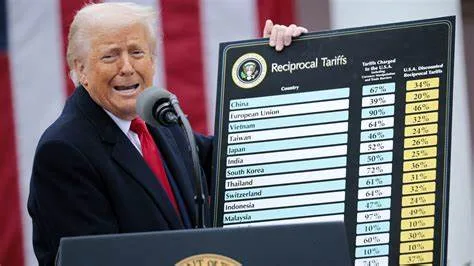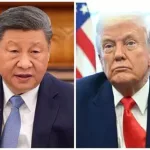Against concerns that Nigeria and other developing economies may be impacted by the new tariff war declared by the United States, some analysts said it would likely have less impact on Nigeria.
The U.S. president, Donald Trump, had on Wednesday, 2 April, announced a baseline 10 per cent tariff on all U.S. imports.
Join our WhatsApp ChannelUnder the tariff plan, the US imposed a 14 per cent trade tariff on Nigerian exports to the country, against the 27 per cent that the U.S. government claims it receives from Nigeria.
Trump said it is a “reciprocal tariff to balance trade with the rest of the world.”
Speaking on the impact of the tariff on Nigeria’s economy, Dr. Muda Yusuf, the chief executive officer of Centre for the Promotion of Private Enterprises (CPPE), said it will be limited.
According to Yusuf, Nigeria’s foreign trade with the United States totalled roughly 10 per cent, therefore, the impact might be minimal.
READ ALSO: Why Trump’s Tax Reforms May Reduce Foreign Direct Investment in Nigeria
He said: “The vulnerability of the Nigerian economy to shocks of the current trade war unleashed by President Trump may be very limited.
“Averagely, Nigeria’s external trade exposure to the United States is about 10%.
“Tariffs on just 10% of Nigeria’s total exports might not have a significant effect on Nigeria.
He stated that Nigeria’s merchandise exports were $50.4 billion in 2024, with $5.7 billion (11.3 percent) going to the United States likewise year.
READ ALSO: What Trump’s 25% Tariffs On Imported Vehicles Means For Other Countries
The economic expert further noted that Nigeria’s major export destinations are Spain, France, Netherlands, and Italy, with oil and gas exports accounting for about 90% of exports.
READ ALSO: Naira Crashes To N1,569 Per Dollar After Trump’s Trade Tariff Hike
He pointed out that while automobiles, wheat, and fuel are the main U.S. exports to Nigeria, crude oil, petroleum gas, and nitrogenous fertiliser are Nigeria’s top exports to the United States.
However, Yusuf stated that since the Trump administration had essentially shut off the African Growth and Opportunity Act (AGOA) trade window, Nigeria’s economy might be impacted indirectly by the tariff war.
READ ALSO: AGOA: Nigerian Businesses Empowered On How To Benefit From U.S. Market Opportunities
He added that the retaliatory tariff on the U.S. may result in increased costs of imports into Nigeria from the U.S.
“The trade war and the subsequent retaliatory tariffs would trigger inflationary pressures in the United States.
“This may result in elevated costs for imports into Nigeria from the United States,” he added.
Similarly, Renaissance Capital Africa, in a recent report, said that the tariff on Nigerian exports to the U.S. would have a limited economic impact.
It said the U.S. does not trade much with Africa. It cited data which showed that the US imported $39 billion worth of goods from Africa in 2024, revealing that this is equivalent to its imports from Canada and Mexico in just a month.
Victor Ezeja is a passionate journalist with seven years of experience writing on economy, politics and energy. He holds a Master's degree in Mass Communication.



















